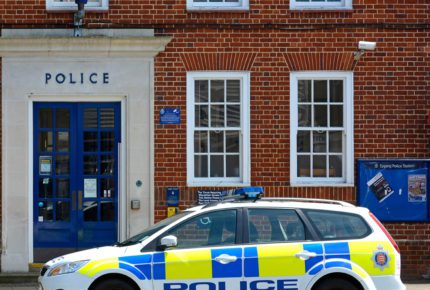

What happens behind the closed doors of the police station when the police investigate a crime? Can other government bodies be involved in the investigation of an offence? What steps do the police take during their investigation, and how do they go about gathering evidence? If you have been arrested on suspicion of a crime, you may be asking yourself some of these types of questions. This article aims to demystify criminal investigations in England and Wales. We explain who investigates crimes in England and Wales, and delve into how police investigations are carried out. We look at the legal duties upon police investigators and disclosure officers. We also explore the time limits involved in police investigations.
Who investigates crimes in England and Wales?
The police, who are organised into territorial police services, i.e. services that cover a specific geographical area, investigate the majority of crimes in England and Wales. However, other specialist agencies are also involved in the investigation of crime. These are specialist police units, which sit outside of local police forces. These include:
- National Wildlife Crime Unit
- National Counter Terrorism Security Office
- National Vehicle Crime Intelligence service
- British Transport Police
There are also non-police law enforcement agencies that are responsible for investigating crimes. These include:
- The National Crime Agency, which investigates serious and organised crime
- Her Majesty’s Revenue and Customs (HMRC), which investigates tax related crime
- Border Force, which is responsible for securing the UK border
- Immigration Enforcement, which investigates immigration offences
- Environment Agency, which investigates environmental crimes
- Offences committed within prisons are usually investigated by Her Majesty’s Prison Service (HMPS)
- Serious Fraud Office, which investigates and prosecutes economic crime
How are police investigations carried out?
Most investigations into crimes are carried out by territorial police forces, such as the Metropolitan Police Service or City of London Police. The police usually take the following steps when investigating a crime. Of course, the order of events will depend on the circumstances in which a crime is reported.
- Gathering evidence: this could include forensic evidence such as fingerprints and DNA, and electronic evidence such as information contained on smart phones, laptops, and in the cloud. It could also include witness evidence – for example, taking a statement from the alleged victim of the crime.
- Arresting a suspect: When the police have a known suspect, and the legal test set out at Section 24 of the Police and Criminal Evidence Act 1984 is met, the police can arrest the suspect.
- Interviewing the suspect: The arrested suspect will usually be interviewed at the police station. The police must read the suspect the police caution and ensure that the suspect is aware of their right to legal advice before the interview takes place.
- Deciding whether to charge: After the police have gathered the relevant evidence in the case, they will need to decide whether there is sufficient evidence to charge the suspect. This is a decision that is taken by the police in less serious cases including summary only offences (cases which must be heard in the Magistrates’ Court) and either way offences (cases which can be heard in the Magistrates’ Court or the Crown Court) where a guilty plea is anticipated. For more serious offences, the police have to refer the case to the CPS for a charging decision.
What are the main duties of investigators and disclosure officers contained within the CPIA Code of Practice?
Criminal investigations by police officers are regulated by the Criminal Procedure and Investigations Act Code of Practice. The Code of Practice sets out the obligations of investigators and disclosure officers.
Investigators are ‘any police officers involved in the conduct of a criminal
investigation.’ A disclosure officer is ‘the person responsible for examining material retained by the police during the investigation; revealing material to the prosecutor
during the investigation and any criminal proceedings resulting from it, and
certifying that he has done this; and disclosing material to the accused at the
request of the prosecutor.’
The Code of Practice highlights key principles that should be followed when the police investigate crime. These include:
- In conducting an investigation, the investigator should pursue all reasonable lines of inquiry, whether these point towards or away from the suspect.
- If the officer in charge of an investigation believes that other persons may be in possession of material that may be relevant to the investigation, and if this has not been obtained, they should ask the disclosure officer to inform them of the existence of the investigation and to invite them to retain the material in case they receive a request for its disclosure.
- If material that may be relevant to the investigation consists of information that is not recorded in any form, the officer in charge of an investigation must ensure that it is recorded in a durable or retrievable form (whether in writing, on video or audio tape, or on computer disk).
- The investigator must retain material obtained in a criminal investigation that may be relevant to the investigation.
- If the officer in charge of an investigation becomes aware as a result of
developments in the case that material previously examined but not retained
(because it was not thought to be relevant) may now be relevant to the
investigation, they should, wherever practicable, take steps to obtain it or ensure that it is retained for further inspection or for production in court if required.
- All material that may be relevant to the investigation must be retained until a
decision is taken whether to institute proceedings against a person for an offence.
- If a criminal investigation results in proceedings being instituted, all material that may be relevant must be retained at least until the accused is acquitted or convicted, or the prosecutor decides not to proceed with the case.
- Where the accused is convicted, all material that may be relevant must be
retained at least until the convicted person is released from custody, or discharged from hospital, in cases where the court imposes a custodial sentence or a hospital order; or six months from the date of conviction, in all other cases.
- If there is material known to the disclosure officer that might assist the defence, this must be disclosed to the prosecutor who will disclose it to the defence.
How long does a police investigation take in England and Wales?
Time limits for police investigations
There is no strict limit on the length of time that a police investigation can take. However, court proceedings for summary only offences (offences that must be heard within the Magistrates’ Court) must be started within six months of the date of the offence. This means that, for example, if you are arrested on suspicion of common assault, your first appearance at the Magistrates’ Court must take place within six months of the date of the alleged assault.
Police custody time limits
The law also imposes limitations on the length of time that the police can remand you in police custody before you are brought before the Magistrates’ Court. The general rule is that you cannot be detained for more than 24 hours before being charged (s41 PACE). However, in certain circumstances, the police can extend this time limit.
The superintendent of a police station can extend the period of detention from 24 to 36 hours where an indictable offence is being investigated, and the superintendent reasonably believes that the further period of detention is necessary to secure or preserve evidence relating to an offence, to seize goods, or interview further witnesses (s42 PACE). The superintendent must be satisfied that the investigation is being conducted diligently and expeditiously.
The 36 hour period of detention can be extended to a maximum of 72 hours where the police make an application to the Magistrates’ Court for a warrant (s43 PACE). These custody time limits do not apply in terrorism cases, where longer periods of detention are permitted under statute.
Bail time limits
In 2022 the law changed to impose a3-month time limit on pre-charge bail. This time limit applies where you are released without charge on conditional or unconditional bail by the police. The aim of this change in law was ostensibly to protect the civil liberties of suspects, to ensure that they are not subjected to indefinite police investigations.
However, the time limit does not apply where you are ‘released under investigation’ by the police. This has led to police tending to release suspects under investigation, rather than placing them on bail, in order to avoid the 3-month time limit. Therefore the change in law has offered limited protection to suspects.
Where to get further information
If you are looking for top quality representation in the criminal courts, contact Stuart Miller Solicitors today. We will fiercely defend you throughout the criminal justice process, from assisting you with bail applications to advising you in respect of whether there is a defence that you could rely upon. We are known for pulling out all the stops to ensure that you receive robust representation in court. Contact us for a no-obligation consultation today.
(This page was last updated on November 15, 2023).
